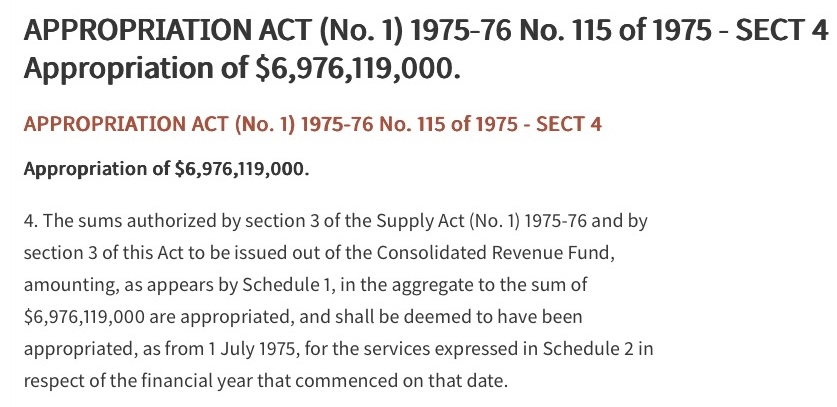

In a couple of weeks it will be the 50 th anniversary of the dismissal of the elected Labor Government of Prime Minister Whitlam Gough by the unelected representative of the hereditary monarchy Governor-General John Kerr.
In those years, nothing has been done to rectify the Constitution to ensure there is no repetition and nothing has been done to rectify the anomalous position the Senate has in our democracy.
The tension between the Executive and the Legislative (or representative) arms of government goes back nearly 800 years. In Britain (and some former colonies such as Australia) the King and his ministers form the Executive and the Legislature is formed by the Parliament – the House of Commons and House of Lords in Britain and the House of Representatives and Senate here. In the US the Executive is the President and the Legislature is the Congress.
The tension plays out in the US with periodic shutdowns when Congress cannot agree on legislation to fund the ordinary operations of government. In Australia in 1975 it played out when the Senate failed to past the Appropriation (or Supply) Bill which would have funded the Government. With Supply blocked, public servants could not be paid and government would grind to a halt, so Kerr dismissed the Government and called on Coalition Opposition Leader Malcolm Fraser (who did not have a majority in the House of Representatives) to form a Government.
Fraser then cleverly told his senators in the evenly divided Senate to vote for the Appropriation Bill which was passed with Labor support because the Labor senators did not know the Labor Government had been dismissed.
Kerr then dissolved Parliament and ordered a double dissolution election. It is far too much power to be vested in one person.
The Senate has too much power if it can withhold Supply from an elected Government and force an early election. And there is a lot else wrong with the constitutional position of the Senate which should be fixed.
A nation that fails to periodically look at its institutions and update them when needed is asking for trouble.
This is what is happening in the US now. It is so tribal that the blame for the present costly and destructive shutdown is ascribed by each side to the other side. It has brought the whole system into disrepute.
At least in Australia Fraser brought upon himself such opprobrium and sense of illegitimacy that no-one has moved to block Supply since. (He only had to wait 18 months and power would have legitimately fallen into his hands at an ordinary election.)
Nonetheless, increasing polarisation in Australian politics might change that. Better to reduce the Senate’s power by having a provision that if it blocks Supply, the previous year’s Supply rolls over.
In addition, several constitutional provisions about the Senate are messing with our democracy and should be changed.
The Constitution provides that size of the Senate has to be approximately half that of the House – the nexus. The size of the House has not been increased for 40 years because no-one wants more Senators, even though the population has doubled and voters are getting only half the access to their local member.
Under the Constitution, senators have fixed six-year terms – from 1 July after an election to 30 June six years later.
It means that if the House term is to be increased to four years, senators would have an unacceptably long eight-year term unless the members of both Houses had fixed four-year terms.
If the Senate blocks legislation, at present the Government would have to call an election for both Houses – a double dissolution – and a joint sitting after the election if the Senate continued to block the legislation if the Government wanted to get its legislation through. It would be better to have a system that any blocked legislation could be presented after the subsequent election and be passed by the House alone if the Government had been returned.
At least the people would have seen the exact legislation and in effect approved it by returning the Government.
It would be a bit similar to the House of Lords in Britain which only has a delaying power not a veto power over legislation. The unelected Lords lost its power to block Supply in 1911, when the Government threatened to create enough new non-conservative lords to get Supply passed.
In Australia, the changes suggested above would also remove some powers and discretion of the Governor-General (and the Prime Minister) – especially over the timing of elections and the dismissal of governments.
Fixed four-year terms would bring more certainty and time for governments to get things done before the next election is upon them.
At least the Australian Constitution prevents tack-on clauses in the Supply Bill that invite partisan blockage of the whole Bill, as in the US. The Republicans’ use of a tack-on measure to deny money to Obamacare is one of the causes of the present shutdown.
In Australia the Supply Bill can only be a simple Bill to appropriate a set amount for the ordinary business of government. In 1975 it was a very brief Bill to appropriate $6,976,119,000.
Any new taxes or other revenue measures or detailed spending measures have to be legislated separately, and may or may not be passed by the Senate. But if the Supply Bill is passed the business of government can continue.
Even so, clauses in the Constitution about the Senate are a major sticking point for four-year fixed terms. Fifty years after the dismissal, the major parties should put recrimination aside and work towards removing them and improve the system of government. And they would have to agree if any referendum is to pass.
Crispin Hull
This article first appeared in The Canberra Times and other Australian media on 28 October 2025.